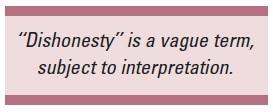Firing for ‘dishonesty’? Offer specifics about what happened
Like most employers, you probably have general rules about what constitutes a firing offense—and “dishonesty” is probably on the list of no-no’s. It’s a vague term, subject to interpretation.
That’s a good reason to make your disciplinary records specific. You want to show exactly why you believe a particular incident violated your dishonesty rule.
 Recent case: Denise, who is black, was fired from her job as a driver for UPS after several suspensions because of package-delivery irregularities. UPS has a general dishonesty rule that includes misstatements about delivery times, methods and customer package instructions. Violating the rules could warrant discipline, up to discharge.
Recent case: Denise, who is black, was fired from her job as a driver for UPS after several suspensions because of package-delivery irregularities. UPS has a general dishonesty rule that includes misstatements about delivery times, methods and customer package instructions. Violating the rules could warrant discipline, up to discharge.
The company uses a hand-held delivery tracking device that requires drivers to record each package along the way, including when and where it was delivered, each delivery attempt and any special customer requests or comments. That way, customers can track each package from origin to delivery, either online or through a customer-service call center.
Drivers are warned that not scanning packages or otherwise manipulating the system to make it appear as if packages were delivered on time when they were not violates the honesty rules. They are also warned that if several packages are delivered to the same location, they cannot mark the deliveries as separate ones, but must indicate they have made just one stop.
Denise was fired and reinstated twice before her final disciplinary hearing. Each time involved scanning irregularities or slow deliveries. For example, she was accused of changing customer instructions on urgent packages that had early-morning delivery deadlines. She was accused of indicating that the customer had requested a later delivery when no such request had been made. She also allegedly entered information showing that she made separate stops to deliver packages when she made just one stop to deliver them all.
She also took a long time to learn her route, requiring twice as many training rides as normal.
Finally, Denise was alleged to have left packages on her truck after failing to attempt delivery that day. She entered false information into the scanning system, indicating that the recipients’ businesses were closed; in fact, they were open.
This time, Denise was fired for good.
She sued, alleging discrimination. She claimed that other drivers who didn’t belong to her protected classes (female and black) had kept their jobs following similar allegedly dishonest behavior.
But UPS showed that none had the long disciplinary history Denise had, nor had they committed as many separate violations of the honesty rules. Company records were very specific—with each dishonesty violation carefully explained, down to individual package delivery details. That was good enough for the court to dismiss the case. (Shipman v. UPS, No. 5:12-CV-589, ED NC, 2013)
Final note: In discipline, details matter. Firing someone for being “dishonest” is subject to interpretation. But firing someone because she falsified a series of delivery records (and providing examples) is concrete and specific.
Those kinds of details will help you differentiate between employees who deserved a warning or lesser sanction and those who deserved discharge.






